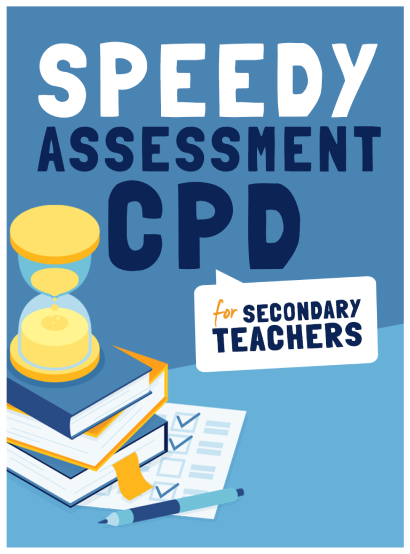Ongoing assessment – Why we do what we do

Ongoing school assessment can help to keep outcomes on track, notes Daniel Harvey – but do your colleagues know what ‘on track’ looks like?

Around 11 years ago, I remember taking part in several CPD/INSET events. These were focused on how to show Ofsted that we were making ‘rapid progress in 20 minutes’.
Some of this work was being led by teachers and school leaders who I very much respected. But the fact remains that this training actually happened.
Interestingly, what was presented to us was duly implemented in an inspection that followed later that year. The inspectors evidently lapped this work up, since the school went on to achieve a Good rating.
During another, later inspection, I can remember presenting to a different set of inspectors, alongside some senior colleagues, reams of hastily prepared spreadsheet data. This used National Curriculum levels to show how clear and obvious progress was being made at KS3. Once again, this approach helped us to achieve a successful outcome.
Evidence-informed strategies
I present those opening paragraphs to paint a picture of what now seems like a different time in the English education system.
Thankfully, due to the work of many teachers, school leaders and educationalists, the kind of thinking that saw us prosper then has since been replaced by more principled, evidence-informed strategies.
Particularly notable at the time was subsequent work by the likes of Rob Coe, Mary Wyatt, Mike Cladingbowl and Sean Harford. This succeeded in changing the conversation, and in turn the broader focus of school development and Ofsted’s inspection framework.
I don’t want to use this article to bash Ofsted, but I’m glad that the practice observed back then of grading lessons – and therefore teachers, in some schools – has long fallen out of favour.
Since it’s worth remembering the role school assessment processes sometimes played in assisting this work, what I’d like to do here is set out what principled assessment in a school ought to look like, and what it should be used to achieve.
Intent, implementation and impact
Amanda Spielman’s time as Ofsted’s HMCI has coincided with a major, perhaps even revolutionary change in the focus of the inspection framework. Ofsted now considers a school’s investment in the quality of the curriculum it provides to be of paramount importance. Though what Ofsted now describes as a school’s ‘curriculum intent’, ‘implementation’ and ‘impact’, I’ve always taken to respectively mean ‘the planned curriculum’, ‘the taught curriculum’ and ‘the learned curriculum’.
Well planned, accurate and reliable assessment can and should inform all three of these areas. For example, the planned curriculum should include details about student misconceptions and how best to address these.
Ongoing assessment also needs to take into account that we now see learning as what’s remembered over time. This is rather than a change in long-term memory. This is a definition first offered by Sweller et al in 2011.
Present capabilities
That said, a school’s investment in its curriculum will be undone unless the planned assessment is sympathetic to the needs of both students and teachers. Teachers should be able to develop their practice so that their use of assessment makes their teaching stick over time.
Teachers can present accurate and valid practice tasks in lessons. But these need to match the present capabilities of students. This is so that they can achieve success when facing tasks that aren’t too easy or too hard.
The bedrock of a school’s assessment approach should involve incrementally increasing the demands of practice to the required standard – i.e. the standards set out in the planned curriculum – and then providing accurate feedback to enable student success.
Teachers also need to be clear about about the difference between assessment at the point of learning and assessment from the point of learning.
Teaching should reflect the demands of both assessment forms. This means it’s essential to design assessments that are equally effective in different situations. This needs to be a regular focus for schools. Specific subject teams should take time to consider the efficacy of the assessments they use.
Questions worth asking about ongoing assessment
All this leaves schools with a set of questions that they need to be able to answer in detail:
- What is the purpose of assessment in this school? How does it serve students, teachers and the wider school community?
- Who will benefit from this assessment process, and in what ways?
- How can you model success for students, in a way that prompts them into preparing effectively prior to their taking of the assessments in question?
As well as paying heed to these considerations, staff will benefit greatly from clarity around when assessments will take place. Make it clear how the school’s leadership intends to check whether different subjects sufficiently reflect the rigour and standards of the planned curriculum.
At the same time, think about how you can use assessment to check the quality of the planned/taught curriculum itself. Make sure staff are aware of the inferences that leaders will make from the assessment data they submit. This is whether it’s at a student, class, year group or subject level.
Is everyone aware of how you intend to record and report your assessment data?
Responding to these questions will enable schools to be very clear about what they’re doing when Ofsted ask them about it, and why they do what they do.
The art of justifying
30 years into my teaching career, I now recognise that getting assessment right is one of the most important and challenging domains for a school leader.
Pitched against that, however, is a tendency among teachers that being able to have faith in their own judgments far outweighs the need to invest time in reviewing and uncovering evidence on whether their school-wide and classroom-based assessments are sufficiently effective.
I’ve personally become wary of extrapolating particular judgments from a test, exam or assessment score. That’s why I’m glad many new NPQ courses include specific sections on assessment. Because of this, teachers can develop a more nuanced understanding of the educational domain via examination of key evidence studies.
In time, this will hopefully result in a more discerning and evidence-informed approach – from both school leaders and middle leaders – to embedding effective assessment strategies which work for the benefit of students, teachers and the school more generally.
The ability to justify the reasons behind certain assessment design and implementation decisions can be hugely beneficial for school leaders come inspection time.
A key means of getting there would be for school staff to be used to having internal conversations around the choices and decisions made in curriculum and assessment design.
Accurately capturing these decisions and justifications at the time can help leaders and teachers craft more coherent and articulate arguments when they later come to share the vision they have for the school. At the same time, it also shows precisely how existing curriculum plans are being fully and effectively implemented.
Daniel Harvey is a GCSE and A Level science teacher. He is also lead on behaviour, pastoral and school culture at his inner city academy












